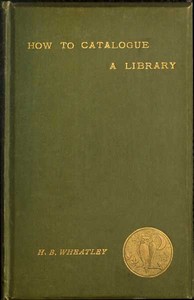How to Catalogue a Library by Henry B. Wheatley
"How to Catalogue a Library" by Henry B. Wheatley is a guidebook on library cataloguing practices written in the late 19th century. The text serves as a foundational resource, providing principles and methodologies that aim to assist both amateurs and professionals involved in the cataloguing process. With a focus on small and ordinary libraries, the book highlights the importance of clarity, organization, and the role of the cataloguer in facilitating book retrieval
for readers. The opening of the work sets the stage for a thorough exploration of what constitutes a catalogue. Wheatley discusses the common misconceptions surrounding the cataloguing process, emphasizing that creating an effective catalogue requires more than simply listing titles; it demands an understanding of indexing methodology and user access needs. He articulates the necessity of discerning between a mere list and a carefully constructed catalogue, advocating for a systematic approach that considers both the intricacies of bibliographical details and the user's perspective. (This is an automatically generated summary.)
Read or download for free
| How to read | Url | Size | |||
|---|---|---|---|---|---|
| Read now! | https://www.gutenberg.org/ebooks/41813.html.images | 379 kB | |||
| EPUB3 (E-readers incl. Send-to-Kindle) | https://www.gutenberg.org/ebooks/41813.epub3.images | 193 kB | |||
| EPUB (older E-readers) | https://www.gutenberg.org/ebooks/41813.epub.images | 196 kB | |||
| EPUB (no images, older E-readers) | https://www.gutenberg.org/ebooks/41813.epub.noimages | 153 kB | |||
| Kindle | https://www.gutenberg.org/ebooks/41813.kf8.images | 364 kB | |||
| older Kindles | https://www.gutenberg.org/ebooks/41813.kindle.images | 307 kB | |||
| Plain Text UTF-8 | https://www.gutenberg.org/ebooks/41813.txt.utf-8 | 306 kB | |||
| Download HTML (zip) | https://www.gutenberg.org/cache/epub/41813/pg41813-h.zip | 179 kB | |||
| There may be more files related to this item. | |||||
Similar Books
About this eBook
| Author | Wheatley, Henry B. (Henry Benjamin), 1838-1917 |
|---|---|
| LoC No. | 46040543 |
| Title | How to Catalogue a Library |
| Note | Reading ease score: 59.2 (10th to 12th grade). Somewhat difficult to read. |
| Contents | Introduction -- Battle of the rules -- Print versus manuscript -- How to treat a title-page -- References and subject index -- Arrangement -- Something about MSS. -- Rules for a small library. |
| Credits | E-text prepared by Adrian Mastronardi, C.S. Beers, and the Online Distributed Proofreading Team (http://www.pgdp.net) from page images generously made available by Internet Archive/American Libraries (http://archive.org/details/americana) |
| Language | English |
| LoC Class | Z: Bibliography, Library science |
| Subject | Cataloging -- Great Britain |
| Category | Text |
| EBook-No. | 41813 |
| Release Date | Jan 10, 2013 |
| Copyright Status | Public domain in the USA. |
| Downloads | 111 downloads in the last 30 days. |
| Project Gutenberg eBooks are always free! | |

